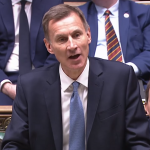Why not nationalise to cut the deficit?
The national deficit isn’t really a problem. Well, at least, certainly not in the short or medium term. The UK government is borrowing less per unit GDP than most other Western countries. And 80% of this money is borrowed from UK citizens – largely pension funds. This means, in the unlikely event that interest rates do go up, the money will go into our pension coffers, and, if they want, the government could take it back in tax.
But the Conservatives have never let the truth get in the way of a good scare story. So, just to humour them, let’s play along.
Lefties have been using three arguments:
1) In the short term, we shouldn’t cut spending as this will take money out of the economy – or, “you don’t solve unemployment by cutting jobs” as I like to put it.
2) In the medium term, if we still have a deficit problem, we should raise taxes on big corporations on multi-millionare tax dodgers.
3) In the medium term, if we do have to cut things, we should cut spending which is socially useless/destructive, like trident, or keeping people locked up in prison.
But there are things governments can do to raise revenue along-side raising taxes, and so my question here is, why don’t we have a fourth item on this list?: Why aren’t we proposing state owned companies earning cash to pay off the deficit?
Historically, many of the UK’s industries were owned by the state, and all of their profits went straight into funding public services. In fact, presumably, when the welfare state was founded, tax was only one of many revenue streams which funded it.
We have, of course, begun this process.
In 2008 the government nationalised RBS, Lloyds Banking Group (including HBOS), Bradford & Bingley, and Northern Rock. They were on the brink of collapse, and risked taking the rest of the country with them. As these banks have started to grow again, we have seen shareholder dividends begin to re-plenish the public purse. If we are being forced to bear the burden of the mistakes of these monopolies, why doesn’t it work the other way round? Why can’t we nationalise the profits of other monopolies?
To put it another way, if paying off the deficit is really our number one national priority, then why doesn’t the state broaden it’s earning capacity?
There are some obvious places to start – in particular, the more recently privitised monopolistic services. For example, BT recently reported profits of £375 million pounds. Why can’t we re-nationalise, and take this money into public coffers? It’s not like BT’s customer service quality has soared under the rigour of competition to run our phone lines from, erm, no one.
Obviously we wouldn’t want a re-nationalised BT to behave as badly as it has since privatisation. While privatised industries get away with externalising massive costs onto society, nationalised industries – particularly if they are monopolies and so customers have no choice – are run with broader aims than profits alone. But that doesn’t mean they can’t make profits.
With some of these services, there are contracts which will, one day, need to be renewed. The deficit, if it is a problem, is a long term one. So we can wait. For other industries – again, BT is an example – there are no contracts to renew. But there are ombudsmen/women. Is there a good reason why Ofcom can’t begin to place sufficient conditions on BT that the private company would fold, then take them into government ownership and remove the conditions? The EU would squeek, sure, but they have bigger fish to fry at the moment.
Along with national monopolies, there are also some companies Local Authorities could be running – not necessarily as monopolies, but in competition with the market. For example, the Norwich Green Party manifesto proposes that, if they take control of the council next month they may set up their own Energy Services Company. Such a company would not preclude private sector competition, but would likely deliver a decent earner for the council, and a good service for local people who wished to use it.
So, is there a reason why we aren’t arguing that nationalisation – or municipalisation – is a way to prevent cuts to public services?



Stuart – yes, indeed – why the hell are we selling off these banks?!
Hi Adam,
Just catching up on my Bright Green reading (its been months…).
Interesting article, and one I agree with.
There was an article in the Times recently pointing out how train users in England are now subsiding the German State, since Deutsche Bahn bought shares in Arriva.
How about Vattenfall? Developing some pretty big windfarms right now, that will generate an awful lot of cash for the Swedish State… or EDF? Again, they’re doing windfarms AND nuclear!! The French must be SO proud!
And us? Well, the Ordnance Survey generates around £20m each year for the UK Government. That’s right, while almost every other EU government generates income for its public services through VERY profitable industries, we keep to what we know best… maps… oh until the government (and the Guardian) decided that most of it should be free…
So anyway, can somene PLEASE explain to me why we are planning on selling off all these banks??
How should they be nationalised?
Do you mean “seized by the state”, in which case I think the share holders and pension funds (and, in the case of some utilities, foreign governments who support companies that own our utilitites when they probably shouldn’t be – I’m looking at you France) won’t be very happy and it would cause massive instability in the market and probably a rapid devaluation of the pound.
If you mean “buy up all the shares in the company until the government own it”, then of course the markets and share holders and pension funds would be very happy, as it would inflate the share values, but we probably can’t afford to buy up all the shares in foreign owned utilities companies. Of course, finding all the money to buy the shares would massively increase the deficit.
Of course, we could just buy up the objectionable bits of the economy. Like anything belonging to NewsCorp…
A better idea might be to have a garage sale. I’m sure there are bits of the country that have just been stuck in a cupboard gathering dust because no-one uses them any more. We could auction off a couple of mountains or a bit of coastline here and there.
Hi blanco – erm, did you read the rest of my piece? I argue that in the long term, in order to pay off the deficit, we should be nationalising things – so, yes, we do eventually need to pay off the deficit.
for me, it’s about democracy – I think the economy needs to be democratised. This will often be through structures other than the state – mutuals, co-ops, etc. But with things which are best run nationally, and are natural monopolies, I don’t have a problem with asking for nationalisation…
Adam
“The national deficit isn’t really a problem.”
Off the bat, you do realise that even the likes of Krugman disagree with you on that? You will cite Keynes (so much for being the anti-capitalist party!) but he said what he said about running a deficit in a recession on the assumption that governments would ramp up taxes in the good times?
Of course, that – and this sentence “if they want, the government could take it back in tax” – are politically impossible. No government will ever charge the amount of tax you want in order to fund the size of state that you want. It’s just not politically possible in the UK. The taxpayers won’t pay for it. So we can’t have it.
Greens should be in favour of a more decentralised, smaller state anyway – with LESS consumption and LESS growth. You just sound like a bunch of Old Labour lefties.